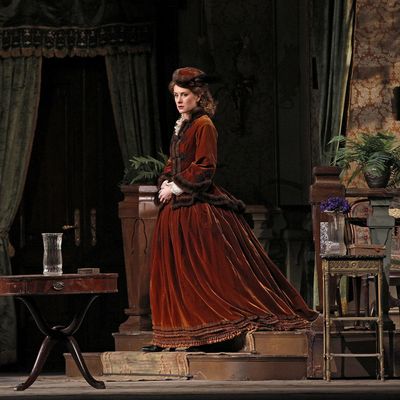
Richard Strauss’s opera Arabella is a work of virtuosic nostalgia. In July 1933, when Germany had already taken its first steps into the inferno, Strauss produced a glittering romance full of fancy balls, last waltzes, mistaken identities, and virginal kisses. With music that recalled his 1911 opera Rosenkavalier, set in the Vienna of half a century before that and centered on an ancient family well past its glory days, Arabella is a layer cake of wistfulness. The Metropolitan Opera has ladled out its own stock of memories. The late Otto Schenck’s production, a gilded cornucopia of wrought-iron balustrades, circular settees, chandeliers, and drapery, originated during the Reagan years and hasn’t been seen here since 2001. The deluxe, ahh-inducing décor is profoundly out of fashion at the Met, but in this piece it feels just right.
Strauss in his ballroom-and-boudoir mode demands tenderness, humor, and delicacy, and conductor Philippe Auguin obliges, whipping the creamy score to firm peaks. The Met has fielded, with one exception, an unexceptional cast. Malin Byström sings the title role adequately, with a sparkly voice and the well-mannered caution of an ingénue. That would be fine in a smaller house, or if she didn’t spend so many hours on the stage, or if we were not told that she bewitches every male who gets a glimpse of her. But at the Met, Byström seems all gown and no spirit.
I have a buried lede to unearth, however: the Met debut of Michael Volle, a 54-year-old German baritone who is enjoying a triumphant second act at an age when most opera singers are starting to think about teaching. Volle sings the role of Mandryka, an earnest and wealthy but unpolished gentleman farmer from the backwoods of Slovenia, who comes to Vienna and is thunderstruck by Arabella. He can be played as a blustering bumpkin or as a sweet but dim provincial, but the role’s real challenge is to persuade the audience that a gossamer society girl would fall for him. (His money helps, but it’s not enough.) From this quasi-caricature, Volle fashions a genuine human being—proud but fragile, loving yet angry, loyal but insecure. He is often at his best when silent: it’s the rare opera singer who can shrug so eloquently or get nearly 4,000 people to laugh at a roll of his eye. Though his voice gets tired in this talky opera, Volle remains a superb musician, modulating from lover’s serenade to peasant bellow with unaffected charm. The Met has asked him to sing Wagner’s Wotan in a few years, which will be a delicate trick of timing, since the larynx coarsens even as the musical spirit gets more refined. That’s okay. Strauss knew a thing or two about the misalignments of age and desire, and judging from this poignant Mandryka, Michael Volle does too.
Arabella is at the Metropolitan Opera through April 24.





